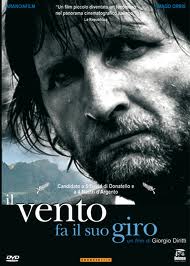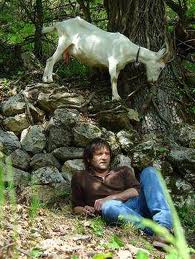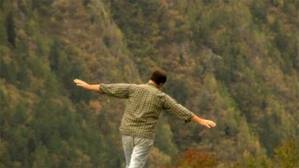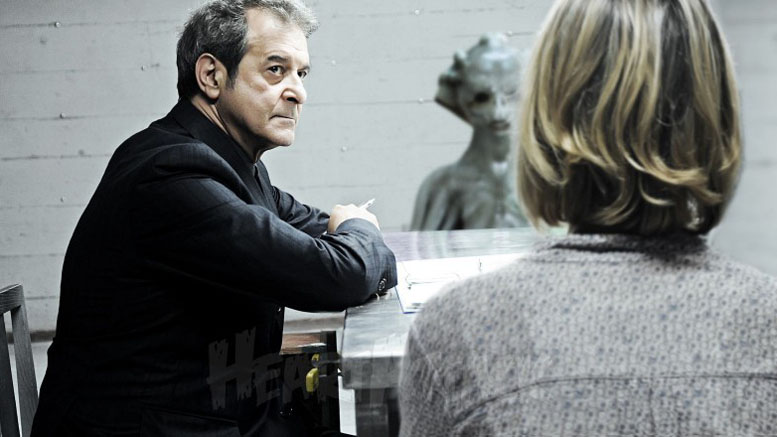
2005
Aka E il vento fa il suo giro, The Wind Blows Round, E l’aura fai son vir
110 minutes
Italy
Produced by Simone Bachini, Mario Chemello and Giorgio Diritti for Aranciafilm, Imago Orbis Audiovisivi (Bologna)
Italian release date: 08-05-2007
Director: Giorgio Diritti
Story: Fredo Valla
Screenplay: Giorgio Diritti, Fredo Valla
Cinematogrpahy: Roberto Cimatti
Music: Marco Biscarini, Daniele Furlati
Editor: Edu Crespo, Giorgio Diritti
Cast: Thierry Toscan (Philippe Heraud), Alessandra Agosti (Chris Heraud), Dario Anghilante (Costanzo, the mayor), Giovanni Foresti (Fausto), Emma Giusiano, Sergio Piasco, Vittorio Luciano, Lidia Ellena, Giuseppe Rinaudo, Piero Tomassino, Bruno Manzo, Nadia Belliardo, Angelo Martelli, Bruno Demaria, Bernardo Giaime, Frederique Chiampo, Caterina Damiano, Daniele Mattalia, Ines Cavalcanti, Kevin Chiampo, Giacomino Allais
Here’s a pleasant surprise: an award winning Italian film which really lives up to its reputation. The debut film of Giorgio Diritti, a graduate from shorts and documentaries, Il vento fa il suo giro scored well with critics, picking up a number of David di Donatello and Italian National Syndicate of Film Journalists nominations, but it wasn’t quite so successful commercially and only received international distribution on the festival circuit. It’s not hard to see why; it’s deliberately paced and, quite frankly, not a great deal happens, giving it much less popular or multinational attractiveness than, say, Gomorrah or Il divo. And when the film it was pipped to for most of the aforementioned awards – Andrea Molaioli’s La ragazza del lago – received limited international distribution despite its apparently broad appeal; well, what hope did it have.

Chersogno, a sleepy Alpine village is gradually turning into a ghost town: the lack of opportunities is driving away the young and leaving behind an ageing population, all the property is being bought up as holiday homes and even the mayor has moved into the nearest city because it’s so boring. So when a French newcomer, Philippe (Thierry Toscan), arrives with his young family in tow, it causes something of an uproar. And Philippe himself divides opinions too; an ex-college professor who has become disillusioned with civilisation, he’s started anew as an unconventional manufacturer of a rather tasty goat’s cheese. Nonetheless, the prospect of the arrival of new blood, not to mention a new business, encourages the people to perform a ‘rueido’, when the whole community comes together to help out one individual for the sake of others: the men restore the villa that has been rented to Philippe’s family, the women cook a feast of pasta.
Despite the positive start, problems soon begin to mount up: Philippe’s goats repeatedly stray into the land of the fearsome old bat who lives next door; his refusal to let the priest bless the house creates a stir; there’s a quarrel over a young man he employs. When he intervenes in a domestic quarrel it’s the last straw for many of the villagers, and they begin an active campaign to force him out.
Il vento fa il suo giro is a rather slow and frequently obtuse film, but at the same time it’s strangely engrossing. Although the story isn’t exactly jam-packed with event – the most thrilling moment comes with the discovery of a dead pig – the narrative has a definite sense of progression, and it draws you in thanks to the carefully constructed characters, most of whom are variants on standard rural Italian ‘types’ from other films: the village idiot, the idealistic newcomer, the peeping tom, the torn young man. It all looks absolutely wonderful, with the beautiful Piedmontese locations stealing the show, and in combination with the effective soundtrack Diritti succeeds in creating a compulsively oppressive ambience that perfectly captures the timelessness of the location. The title itself refers to a popular idiom: “The wind blows round and everything comes back sooner or later.”

Of course, the whole thing is allegorical: Philippe and his family stand for immigrants in general, welcomed into the community when they are seen as providing some kind of service but rapidly falling foul of the ingrained intolerance and cowardice of the existing population. Immigration has been a hot topic in Italian cinema for a few years now, but this is one of the more watchable films dealing with the subject, primarily because it doesn’t treat it with the usual sledgehammer approach. The Occitan people are seen in both a positive and negative light, a community that’s rooted to the past because of the increasing evidence of its own finite nature but is equally capable of good as well as bad acts. Philippe, furthermore, is his own worst enemy; his inability to compromise his ideals only alienates him further from the villagers, and even those who are sympathetic to him feel unable to give support as his behaviour becomes increasingly antagonistic. Perhaps, most ironically of all, Philippe, who strives so hard to be unconventional, ends up becoming that cliché of convention: an absent father who’s too busy working to spend any time with his wife and kids.
Largely performed by amateurs, the acting is effective, if a little raw in places, with Toscan and Giovanni Foresti (as a disillusioned musician) being particularly effective. Diritti went on to direct another acclaimed film in 2009, L’uomo che verrà, about the Marzabotto Massacre on 1943. It’s also possibly worth noting that there although they’re very different films in terms of subject, there are certain similarities between Il vento fa il suo giro and La ragazza del lago: they are both set in isolated, mountainous communities, feature a cast of colourful characters and end with the sense that everything which has happened in the films is merely momentary, in contrast to the solidity of the landscapes they take place in.
Here’s the Italian trailer:
